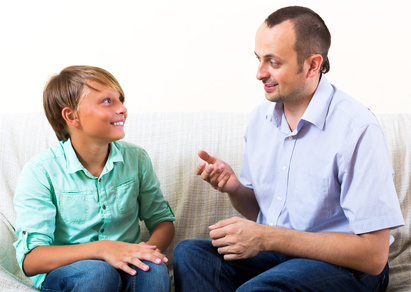Get More Love in Your ADHD Family
Too often ADHD families are so busy dealing with the stress of daily living that cultivating loving connections can take a back seat more that everyone would like. Recently I read “The 5 love languages: The secret to love that lasts” by Gary Chapman. In this best-selling book, he starts with the idea (from Dr. Ross Campbell) that we carry around from childhood an internal ’emotional love tank” waiting to be filled with caring, affection and kindness. When this happens, children develop normally but when the tank is empty, kids misbehave (p.20). Mr. Chapman thinks adults have the same needs but fail to give love in ways their partners can actually receive it. In looking at couples and how they can improve their relationships, he identifies 5 ways of communicating love: words of affirmation, quality time, receiving gifts, acts of service and physical touch.  I think Mr. Chapman’s ideas apply just as well to ADHD families. When you are running to the lacrosse field to bring your daughter the cleats she forgot yet again, when you are arguing with your son to pick up the mountain of dirty clothes off his floor so you can find the missing library book or when you are sitting down for the nightly homework struggle, taking the time to consider how to express your love for your ADHD child is likely not at the forefront of your mind. You are just trying to manage the stressful situation in front of you. But, there are other moments when it can be. Quieter, calmer times like the moments when you read a story, when you share a snack, when you chat casually in the car. The value of the Mr. Chapman’s model lies in figuring out how your ADHD son or daughter best receives love and tries to express it to you. This understanding will promote a natural give-and-take of closeness that will fuel both of your love tanks. First, start with yourself. Ask yourself what feels best to you. Is it when someone says something nice to you about you or something you have done (words of affirmation)? Is it spending meaningful time doing something together (quality time)? Is it getting a special something, a token of thanks (receiving gifts)? Is it when someone does something helpful or nice for you (acts of service)? Is it being hugged, caressed or holding hands (physical touch)? While these all may be important, try to decide on your top two choices.
I think Mr. Chapman’s ideas apply just as well to ADHD families. When you are running to the lacrosse field to bring your daughter the cleats she forgot yet again, when you are arguing with your son to pick up the mountain of dirty clothes off his floor so you can find the missing library book or when you are sitting down for the nightly homework struggle, taking the time to consider how to express your love for your ADHD child is likely not at the forefront of your mind. You are just trying to manage the stressful situation in front of you. But, there are other moments when it can be. Quieter, calmer times like the moments when you read a story, when you share a snack, when you chat casually in the car. The value of the Mr. Chapman’s model lies in figuring out how your ADHD son or daughter best receives love and tries to express it to you. This understanding will promote a natural give-and-take of closeness that will fuel both of your love tanks. First, start with yourself. Ask yourself what feels best to you. Is it when someone says something nice to you about you or something you have done (words of affirmation)? Is it spending meaningful time doing something together (quality time)? Is it getting a special something, a token of thanks (receiving gifts)? Is it when someone does something helpful or nice for you (acts of service)? Is it being hugged, caressed or holding hands (physical touch)? While these all may be important, try to decide on your top two choices.  Then consider your child. What do you notice feels good to him or her? What do you think helps the two of you feel close? Again, pick your top two choices. Next, ask them. This conversation itself is already enriching your relationship. See if you can make an agreement about what filling their love tank looks like (be as specific as possible but ruling out buying gifts daily). Have them pick the most important one or two. Remember, that what nourishes them might be different than what nourishes you. That’s okay. The goal here is to deepen the positive bonds between you. As their parent, your job is to initiate that.
Then consider your child. What do you notice feels good to him or her? What do you think helps the two of you feel close? Again, pick your top two choices. Next, ask them. This conversation itself is already enriching your relationship. See if you can make an agreement about what filling their love tank looks like (be as specific as possible but ruling out buying gifts daily). Have them pick the most important one or two. Remember, that what nourishes them might be different than what nourishes you. That’s okay. The goal here is to deepen the positive bonds between you. As their parent, your job is to initiate that.  Making a concerted effort to put some extra attention and energy into nurturing the love language that feeds your child the most will certainly strengthen your connection to each other. This bond produces the cooperation, affection, honesty and fun we all want in our families. ADHD kids, who often suffer from feelings of low self-worth and wrestle with many daily frustrations, particularly benefit from being seen and heard. You will reap many rewards–affection, cooperation, humor–by doing more of what feeds them. I am confident that they will start to reciprocate as well and you, too, will get some fuel for your own love tank.
Making a concerted effort to put some extra attention and energy into nurturing the love language that feeds your child the most will certainly strengthen your connection to each other. This bond produces the cooperation, affection, honesty and fun we all want in our families. ADHD kids, who often suffer from feelings of low self-worth and wrestle with many daily frustrations, particularly benefit from being seen and heard. You will reap many rewards–affection, cooperation, humor–by doing more of what feeds them. I am confident that they will start to reciprocate as well and you, too, will get some fuel for your own love tank.
